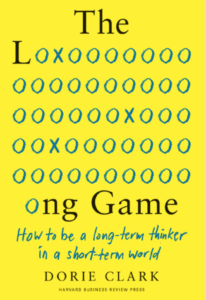14 Aug Are you feeling stuck?
Dorie Clark’s 2021 HRB article Feeling Stuck or Stymied? is full of insights. It’s also practically helpful if you feel your career is moving too slowly or maybe spluttering to a halt. More often, if you feel like this, it’s a case of not giving yourself enough time and permission to succeed.
If you focus on the under-30s who founded unicorns and the under-40s who lead major listed companies, you risk becoming demoralised because you don’t know what’s a reasonable pace for the great majority of executives. You need a framework to understand what’s acceptable progress and a way to explain why some peers are getting ahead faster than you. You need to cultivate what Dorie Clark calls strategic patience. This does not mean being passively accepting; rather, you need to learn to be proactive and thoughtful. Here’s how.
Five steps to your ultimate success
These are summarised from The Long Game by Dorie Clark.

Research the target and the terrain. Most of us have little idea what the road to success looks like. If you are P&L responsible, do you need to grow your profit by 10% or 50% in one or five years? If you lead a team, how many major projects per year do you need to complete successfully? Obsessing with targets and fixating on timelines can lead to despair. It’s much better to draw on others’ experience to identify realistic milestones and markers on your career road. Your goal should be to reach for realistic, researched stretch targets.
Recognise that progress can be barely perceptible. In many situations, e.g. the early stages of innovation or post-merger integration, progress can be hard to discern. As the cover of Dorie Clark’s book (left) indicates, we live in circumstances where short-termism is de rigueur. Most major change takes years to come to fruition. That said, you should, nay must, look for and find small wins along the way – this is how you find inspiration and motivation. Remember, you fill a rain tank one drop at a time.
Leverage your relationships in the right way. It’s natural to benchmark yourself against others. But this is lonely and can be a recipe for feeling like a laggard or, worse, a failure. Don’t judge yourself against someone in the same profession who has 15 years more experience than you. Rather, ask those who know you and who you respect to assess your situation, progress and achievements.
Stop moving your goal posts. Think about the income statement you use to judge actual performance against the budget set at the start of the year. If you change the budget in the course of the year, it’s easy to look good or bad, depending on the direction in which you move the target. It’s the same with your career. When you move the goal posts, you distort and erase the progress you’ve made. You overlook the gains and focus on the gaps. Recognising and celebrating how far you have come inspires you to move forward.
Keep moving in the right direction. While the admonition not to move the goal posts is correct, this does not mean you shouldn’t shift career goals if the change still takes you in the right direction. You can’t foresee all of the future; it may bring you unexpected opportunities. A change of course that’s in the right direction is OK.
In conclusion
The truth is achieving meaningful goals demands effort, perseverance and time. As Arnold Glasow once quipped, The key to everything is patience. You get the chicken by hatching the egg, not by smashing it open.


